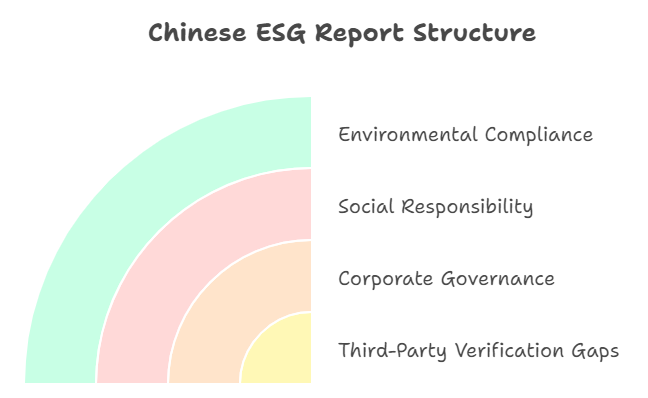Executive Summary:
China’s new Company Law (effective July 1, 2024) mandates enhanced ESG disclosures in corporate annual reports. This guide breaks down what foreign businesses must know about environmental, social, and governance reporting requirements for Chinese partners – including compliance deadlines, data verification methods, and strategic implications for supply chain due diligence.
Why ESG Reporting in China Just Became Non-Negotiable
With Article 20 of China’s newly revised Company Law (2024) explicitly requiring businesses to “consider ecological environmental protection and other social public interests,” ESG disclosures have evolved from voluntary initiatives to legal obligations. For overseas companies vetting Chinese suppliers or investment targets, these reports now offer critical risk intelligence.
Key Compliance Deadlines:
- July 1, 2024: New Company Law takes effect
- 2025 Annual Reports: First filings requiring enhanced ESG alignment
- SOEs & Listed Firms: Stricter SASAC/CSRC guidelines (e.g., mandatory carbon metrics)
Anatomy of a Chinese ESG Report: 4 Critical Sections
Chinese annual reports now integrate ESG data into standardized formats. Here’s what to scrutinize:
1. Environmental Compliance (The Hard Metrics)
- Carbon Emissions: Scope 1/2 reporting for firms in 24 high-pollution sectors (steel, chemicals, textiles)
- Resource Use: Water/energy consumption per RMB 1M revenue
- Penalties: Environmental fines ≥¥50K must be disclosed
Example: A Jiangsu textile supplier’s 2023 report revealed ¥820K in wastewater violations – a red flag for EU importers under CSDDD.
2. Social Responsibility (Labor & Community Impact)
- Employee Demographics: Gender ratios, training hours, turnover rates
- Supply Chain Audits: Subcontractor compliance with SA8000 standards
- Community Investment: Poverty alleviation projects (common for SOEs)
Data Gap Alert: Only 38% of private firms report wage arrears – verify via official labor inspection records.
3. Corporate Governance (Ownership & Control Risks)
- Ultimate Beneficial Owners (UBOs): Cross-shareholding maps now required
- Board Diversity: Independent directors ≥1/3 seats in listed firms
- Anti-Corruption Measures: Internal audit frequency & whistleblower cases
New Law Impact: Article 182 mandates board approval for conflicts of interest – check resolutions for undisclosed related-party transactions.
4. Third-Party Verification Gaps
While financial audits are mandatory, only 12% of Chinese ESG reports carry independent verification. Always cross-reference with:
- Environmental Licenses (EPB database)
- Patent Registrations (CNIPA filings)
- Executive Sanctions (Court records)

3 Obstacles Foreign Businesses Face – And How to Overcome Them
| Challenge | Consequence | Verification Strategy |
|---|---|---|
| “Greenwashing” | Inflated eco-claims | Demand raw utility bills + emission permits |
| Data Fragmentation | ESG scattered across 5+ documents | Request consolidated Enterprise Credit Reports |
| Translation Errors | Misinterpreted safety stats | Use certified bilingual auditors |
Real Case: A German automaker avoided ¥200M in compliance fines by discovering a Zhejiang battery maker’s unreported OSHA violations through their Executive Risk Profile.
Action Plan: Leveraging ESG Data for Safer Partnerships
- Pre-Contract Due Diligence
- Obtain the target’s latest Official Enterprise Credit Report
- Cross-check ESG claims against environmental permits (EPB) and tax filings
- Ongoing Monitoring
- Set automated alerts for ESG penalty updates (e.g., court judgments)
- Conduct annual Business Credit Reviews
- Exit Triggers
- ≥2 major environmental violations in 24 months
- Failure to disclose UBO changes per Article 32
- Executive sanctions for corruption (Article 181)
The Verification Imperative
While China’s ESG framework is maturing, authenticity risks persist. In 2023, Guangdong regulators penalized 47 firms for falsifying carbon data. For overseas partners, third-party verification isn’t optional – it’s strategic insulation.
“An unverified Chinese ESG report is like an unauthenticated passport – it might look legitimate, but the hidden risks could be catastrophic.” – Li Wei, Shanghai Compliance Auditor
Need Reliable ESG Intelligence?
ChinaBizInsight specializes in verified corporate disclosures for international stakeholders. Our due diligence packages include:
- ESG Compliance Audits: Third-party validated environmental/social metrics
- Executive Background Screening: Sanction checks + shareholding verification
- Document Authentication: Apostille/legalization for cross-border compliance
Empower your China partnerships with evidence-based trust. Request a sample report
Sources: China Company Law (2024), SASAC Directive No. 2023-15, KPMG China ESG Reporting Survey (2024)
